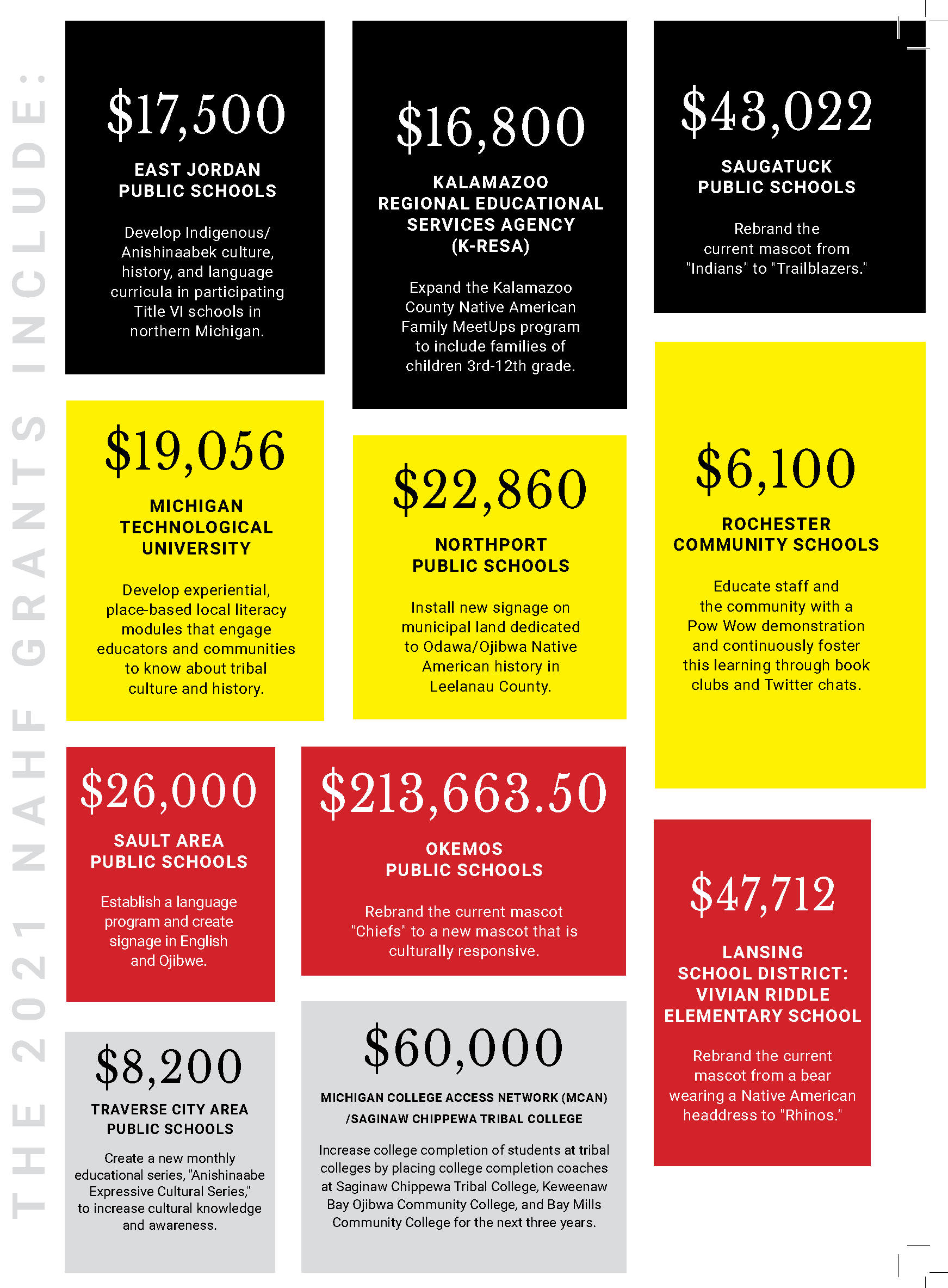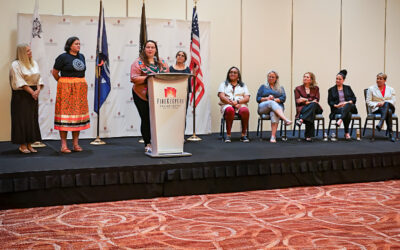The Native American Heritage Fund Distributes 2021 Grants
The Native American Heritage Fund Board awarded over $480,000 in grants during the virtual 2021 NAHF Check Distribution Friday, July 16. The NHBP Seven Grandfather Teachings continue to guide NHBP and NAHF leadership through a time when tensions are high in the United States, with many just now realizing the impacts of the colonialization of Indigenous People and the problem it has created.
NHBP leadership saw issues with the way Native Americans in the state of Michigan were being represented through imagery and educational curriculum and wanted to make changes to improve the lives of the next Seven Generations of Tribal Membership, which was the impetus behind the creation of NAHF. The lasting changes promote inclusivity, where eventually, one day, Native Americans will not only have a say in their history but be in charge of it.
NAHF continues to provide resources to help improve curricula and educational resources related to Michigan Indian history and replace or revise mascots and imagery that may be offensive to or inaccurately convey the culture and values of Native Americans.
According to the NHBP Seven Grandfather Teachings, “Bravery is facing a problem with integrity. We do what is right even when the consequences may be unpleasant. We face life with the courage to use our personal strengths to face difficulties, stand tall through adversity, and make positive choices. We must stand up for our convictions and have courage in our thinking and speaking.”
Though there is division in the world, NHBP Tribal Council has stood strong through the adversity faced in the past few centuries and is determined to make positive changes in the community.
“On behalf of the great Nation of Nottawaseppi Huron Band of the Potawatomi Tribe, NHBP Tribal Council and the NAHF board, Chi Migwéch and thank you to all those participating in this virtual ceremony,” said NHBP Tribal Council Chairperson Jamie Stuck, who is also the NAHF Chairperson. “This year commemorates the fourth year of this one-of-a-kind initiative. It’s these events that move us to do what we do as a community as we work together and partner with each entity. It is an honor and blessing to have the opportunity to share this with our community.”
Tribal Council Secretary Nancy Smit blessed the meeting with a prayer to open in a good way before Tribal Member Owyn Zapata performed a Welcome Song. Tribal Veteran Dale Anderson provided the Smudge and posted the Eagle Staff and colors for the virtual meeting.
This year, the board received and analyzed over $2 million in grant requests. As the meeting progressed, each organization, school or entity was able to speak about their grant request and explain its significance and how it would impact the livelihood of Native Americans in Michigan.
Kalamazoo Regional Educational Services Agency (K-RESA) is using the funds to expand current programming to better the lives of its students and families. Going forward, they plan on expanding the MeetUps program to include families of children in 3rd-12th grade, so younger children can feel supported and learn about their culture earlier.
“We are looking at ways we can bring more cultural experts in talking about issues that are of high need and concern with our families that we work with, especially more urban families that are away from their Tribes and away from their culture,” said Kalamazoo RESA Homeless Liaison and Title I Literacy Facilitator Robin Greymountain. “It is a safe space that our families can get together and learn about anything from food, to clans, to teachings, readings, understanding oral traditions, to whatever you can think of. It is a safe place for our families, but it is also an open space for families to learn and share.”
Northport Public Schools plan to use the funding to install new signage on municipal land dedicated to Odawa/Ojibwa Native American history in Leelanau County. This recognition of land acknowledgment reiterates that Indigenous People were here first and educates their students and families of the history of Odawa and Ojibwa Tribes in Michigan.
“I am delighted to be included in this grant program,” said Northport Public Schools Principal Andrea Burks. “We will be working with the Grand Traverse Band of Ottawa and Chippewa Indians and will be exploring with three different schools some early maps and looking into signage with existing roadways and municipalities. We see this as an opportunity to bring recognition and clarity to what the history of the land was and still is. And also celebrating the heritage within our communities and partnership with the Band.”
Okemos Public Schools plan to rebrand their current mascot from “Chiefs” to a new mascot that is culturally responsive. Okemos Public Schools received support from the community including, NHBP, the Pokagon Band of Potawatomi, the Michigan Department of Civil Rights, Little Traverse Bay Bands of Odawa Indians, United Tribes of Michigan, and Sault St. Marie Tribe of Chippewa Indians.
“Over time, since the 80s, we have been moving away from using Native American imagery and nicknames as a part of our mascot,” Okemos Public Schools Superintendent John Hood said. “We’ve finally made the change and are retiring the name and mascot. We could not have done that without help from the Native American community.”
The change in Okemos has been nearly 40 years in the making, and the school has been divided over the mascot issue and how to honor Chief Okemos while also being culturally sensitive and appropriate. The school board recently voted unanimously, 7-0, to officially retire the Chiefs mascot and imagery completely.
“In this process, we have learned that when we know better, we need to do better,” Hood said. “It was really an educational process for our entire community, and really rooted in our community’s long-standing equity work, where we truly are looking at understanding, acknowledging, and responding to the diverse needs and strengths of all individuals in our community, including our Native American community. We know to honor one is to honor all, and we want to honor all Natives in our community and across the state of Michigan.”
Through the NAHF, NHBP continues to support and promote positive relationships and accurate information about the history and role of Michigan’s Indian Tribes and Native Americans in the state. Each entity chosen by the NAHF board this year will continue to improve these relationships and help cultivate understanding and acceptance.
“This year, 17 different organizations applied for funding through the NAHF,” Stuck said. “We are honored that so many organizations want to enact change and improve relationships between Natives and non-Natives in our home state of Michigan.”





0 Comments